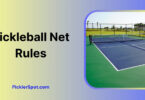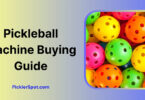Being a Pickleball enthusiast, sometimes it feels like there are so many terminologies that you would lose count considering the fact that understanding them requires quite a bit of finesse.
And for a rookie who is still climbing the learning curve, this could feel like no less than a nightmare to the point that they would eventually lose interest in playing the game altogether.
Speaking of captivating terminologies, today in this article, I am going to shed some light on What is poaching in pickleball where it should be used, and how it affects the flow of the game.
What Exactly Is Poaching In Pickleball?
You may already be familiar with the term “Poaching” if you have some form of interest in animals or have watched a couple of documentaries of national geographics where Individuals are reported to “poach” ivory from animals illegally.
In Pickleball, the term receives a much more humane twist as it implies a shot that is received by a player that is not rightfully theirs or isn’t supposed to be repelled by them.
While it’s a perfectly legal strategy, nevertheless, the terminology sticks because you are basically stealing the shot that was meant for your teammate.
In pickleball, when it’s played in the doubles format, the serve is supposed to be executed in a diagonal direction to the corresponding opponent and unless and until you are playing in singles format, there is no way that you could serve a ball straight.
Now let’s dig into why this strategy is executed,
Significance Of Poaching
There are a couple of reasons why poaching a ball occurs,
1. To Break Rhythm
In Pickleball, in the initial phase, you would find the sessions way too slow and predictive especially when you haven’t proceeded to the rally phase. To make things worse, it becomes undoubtedly frustrating when you are a point down and want to score a couple of points to win a match.
Poaching in such scenarios goes pretty well when complemented with other variations and techniques because it breaks the rhythm of the session by creating a sense of ambiguity so that you can keep the opponent on their toes.
2. To Prevent Teammates Being Exploited
Playing in a team means you should always have your buddy’s back regardless of circumstances, this allows you to bond well over time.
In that case, if you feel like your teammate is being pinned by the opponent that is constantly hitting shots with spins and is exploiting their weakness with poaching you could easily provide cover for them.
This ensures your teammate receives a sigh of relief and catches a break without suffering from fatigue all while you are covering their flank.
3. To Attain Advantage
If you or your teammate is standing right next to the net, poaching can provide a great opportunity to repel a ball with a robust shot which your opponent clearly wouldn’t expect at all, especially if it is lined towards their feet.
Compliment this strategy with a well-timed communication gesture and you would easily turn the tables around, in fact, you would also dismantle pretty much any team regardless of how well they are playing.
To top it off, poaching ensures your defensive strategies are reinforced all while playing aggressively right beside the net.
4. Creates A Spectacle
Everyone loves to spectate a game that has variety and thrill integrated into it, poaching creates an unexpected twist and makes the whole session very exciting to watch. If you want the crowd to be riled up while you are swinging relentlessly, make sure you poach a couple of times to make their experience worthwhile.
In other words, sometimes, a strategy doesn’t really have to be in your favor, you have to give the audience what they want to see.
Disadvantages Of Poaches
Not all the glitters are gold here, there are indeed apparently some scenarios where you should totally avoid poaching at all costs or else you would find yourself in a pickle.
1. Communication Disruption
With poor communication comes the inadvertent downfall, compliment that with a poach and you will see your team collapse in a matter of minutes as it causes confusion and doubts which are harder to be resolved.
The situation is aggravated if you are playing with a rookie who barely has any idea of how to handle a poach or when to lead a poaching shot, so it’s in your best interest that you steer clear of this strategy.
2. Synergy Issues
The dilemma with poaching is that if you do it too often with an inexperienced player it baffles them and makes them think they aren’t worth the time on the court and if you do it too much with a professional player, you would receive a stink eye because it causes resentment and ego related issues as poaching can be a culprit behind a rising level of toxicity especially when performed without a proper communicational gesture.
An uncalled poaching shot also breaks the chemistry with your teammates and even results in a couple of unintentional collisions which is the last thing you would want in your competitive game.
3. Pattern Formation
Poaching too much would make things seem too predictable, making it harder to throw your opponent in the rough spot, in fact, it could easily backfire if you are frequently doing it, so make sure to avoid using it frequently and only do it whenever you feel like your teammate could handle a counter if you are flanking for a poach shot.
On the flip side, too much poaching could break your defensive barrier because it takes away the focus and attention that you may have otherwise utilized when playing in a defensive stance.
What Is Poaching in Pickleball? – Bottom Line
A well-timed poach can work wonders for a team and even turn the tables around, however, it’s a unique tool that should only be used sparingly as it could not only hurt your defense, and ruin your focus but could possibly disrupt the communication with your teammate which is the last thing you would want especially when playing in competitive doubles format in bigger leagues.
Moreover, when executed in casual formats, it takes away the fun aspect because nobody likes to play against a try hard, so make sure you don’t take things too aggressively and let everyone enjoy the game.









